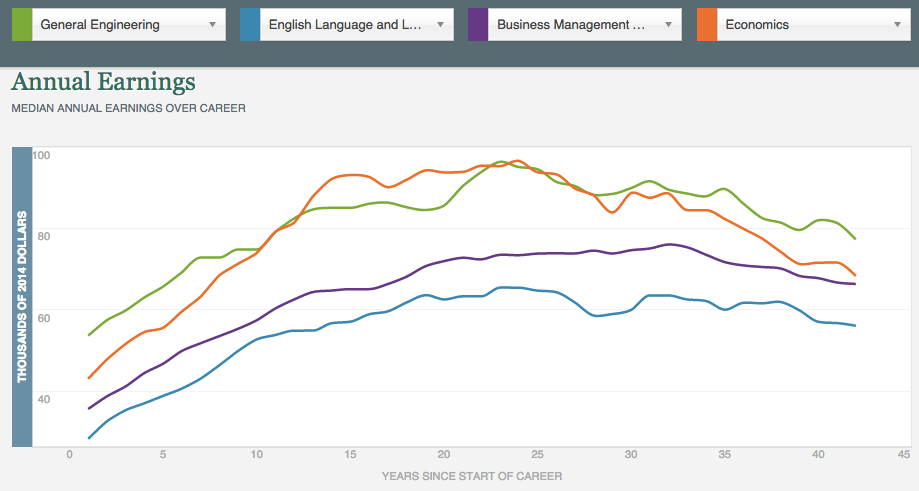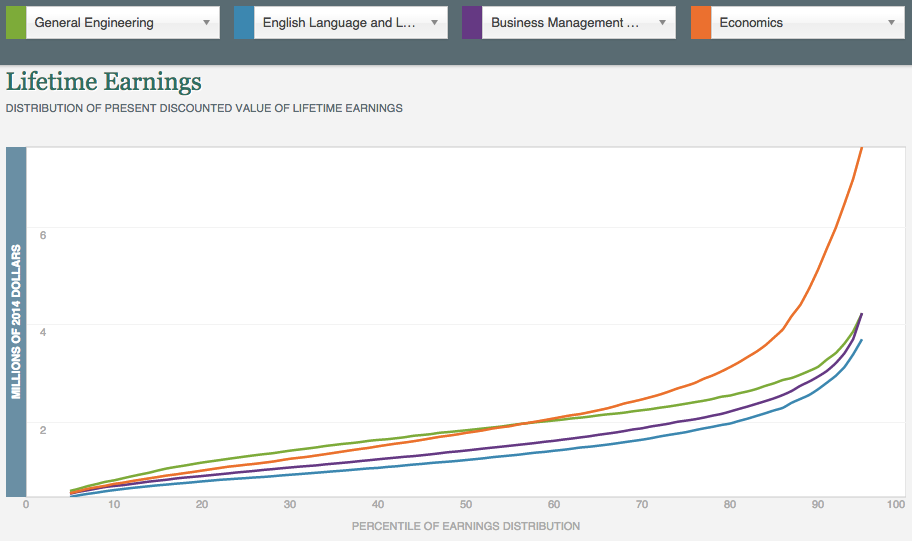Want to guarantee yourself a steady, well-paid career? Major in engineering. Want to take a shot at striking it rich? Then major in economics.
At least, that’s how I’d sum up the findings of a new report and interactive tool from the Hamilton Project, which looks at how the value of a college degree changes depending on your major. This is already a pretty well-explored subject. But the Hamilton study is especially nifty, because instead of calculating what the “typical” college graduate can expect to make over the course of a career, like many researchers do, it shows a whole range of potential outcomes, from the fifth percentile of earners up to the 95th percentile. And of the best-paid graduates in all fields, economics majors rake in the most.
To start off, here’s the sort of graph you’re probably used to seeing. Using data from the Census Bureau, which began asking college graduates about their majors in 2009, it shows the annual income that the median college graduate in four common majors can expect to make in each year of her career. Of the group, English grads make the least, business majors do a bit better, while engineering and econ grads jockey for the top spot. (Quick note: These numbers cover only graduates without advanced degrees. We’ll come back to the grad-schoolers in a bit.)

Now check out how the view changes when, instead of tracking median graduate, we look at all graduates. The graph below depicts the range of lifetime earnings that graduates in each major can expect to make. Up until about the 57th percentile, engineers make the most. But then the earnings curve for economics grads basically goes parabolic. At the 95th percentile, they can expect to earn more than $3 million more during their lifetime than an engineering grad.

Does the outcome change if you start factoring grad school into the equation? Nope. Brad Hershbein, one of the study’s authors, confirmed for me that “at the 95th percentile and above, economics outearns every other major,” whether or not graduates have gone on to earn advanced degrees. For those with just an undergraduate degree, economics becomes the top-paid major at the 92nd percentile, passing engineers who specialize in energy and extraction technology (basically, kids who go to college in order to learn how to drill oil out of the ground). When you factor in Americans with graduate degrees, as in the graph below, econ becomes the top-paid major at the 94th percentile, where it passes biochemistry and molecular biology, which produce lots of doctors. I’ve thrown the energy engineers and history buffs onto the graph as extra points of reference.
So why are econ grads so good at making it rain? Part of it is that the finance and consulting industries like recruiting them, not necessarily for their specific skills, but because they consider the major a basic intelligence test. Granted, we’re probably not seeing the effect of Goldman Sachs or Private Equity salaries in these charts, since they only stop at the 95th percentile of earners—but banking is a big industry, and it pays well. There’s also an element of self-selection. Plenty of engineers have the math skills to hack it at a bank (film fans may recall Stanley Tucci’s speech about how he once built a bridge in Margin Call), but choose a slightly less lucrative but probably more fulfilling career path. Not everyone wants to spend a career turning money into more money. No matter how well it pays.
